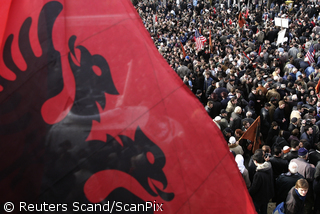Business leaders in Hungary are worried about the country's deteriorating investment climate
Published:
5 October 2003 y., Sunday
Business leaders in Hungary are worried about the country's deteriorating investment climate. Calls on the country's Central Bank to cut interest rates and on the government to curb state spending have so far gone unheeded.
All the Hungarians seem interested in is a major fraud and money-laundering scandal – and especially in the question: who's to blame?
The time when Hungary used to be a model scholar in the transition process to a free market economy has been over for some time. Recent governments - the last one (conservative) under Fidesz leader Viktor Orbán, and the incumbent (left-liberal) coalition led by Péter Medgyessy (no party affiliation) - seem caught up in inter-party squabbling rather than dealing with the necessary political and economic reforms prior to joining the European Union in May next year.
Central Bank governor Zsigmond Járai is becoming increasingly skeptical about the government's stated aim to join the euro zone by 2008. The Finance ministry is constantly coming up with economic growth predictions that have undergone downward adjustments – from 4 percent to 3 to 3.5, recently.
Last year's spring election, with its record turnout, demonstrated that a majority of Hungarians no longer supported Mr Orbán's us-Hungarians-we-are-the-greatest philosophy: by a slim majority voters preferred the alternative, a coalition of socialists and progressive liberals, led by the wealthy businessman-banker Mr Medgyessy.
Šaltinis:
rnw.nl
Copying, publishing, announcing any information from the News.lt portal without written permission of News.lt editorial office is prohibited.
The most popular articles
 Women in the EU earn on average 18% less than men - a gap that has scarcely narrowed over the last 15 years and in some countries has even grown.
more »
Women in the EU earn on average 18% less than men - a gap that has scarcely narrowed over the last 15 years and in some countries has even grown.
more »
 43 gas and electricity projects to split €2.3bn, the most the EU has ever spent on energy infrastructure in a single package.
more »
43 gas and electricity projects to split €2.3bn, the most the EU has ever spent on energy infrastructure in a single package.
more »
 Georgia and the European Union have initialled a comprehensive air services agreement at a meeting in Tbilisi, Georgia, today which will open up and integrate the respective markets, strengthen cooperation and offer new opportunities for consumers and operators.
more »
Georgia and the European Union have initialled a comprehensive air services agreement at a meeting in Tbilisi, Georgia, today which will open up and integrate the respective markets, strengthen cooperation and offer new opportunities for consumers and operators.
more »
 In order to vitalize and strengthen cooperation of business stakeholders in the region, the Nordic and Baltic countries continue running joint mobility programme.
more »
In order to vitalize and strengthen cooperation of business stakeholders in the region, the Nordic and Baltic countries continue running joint mobility programme.
more »
 The EBRD is boosting the availability of financing to the real economy sector in Serbia, with a €20 million credit line to Société Générale Serbia for on-lending to small and medium enterprises.
more »
The EBRD is boosting the availability of financing to the real economy sector in Serbia, with a €20 million credit line to Société Générale Serbia for on-lending to small and medium enterprises.
more »
 The EBRD is supporting the development of the private sector in Armenia and increases further the availability of financing in the real economy sector with a $10 million loan to Ameriabank for on lending to local companies under its Medium Sized Co-financing Facility (MCFF).
more »
The EBRD is supporting the development of the private sector in Armenia and increases further the availability of financing in the real economy sector with a $10 million loan to Ameriabank for on lending to local companies under its Medium Sized Co-financing Facility (MCFF).
more »
 The EBRD is supporting the modernisation and improvement of transport infrastructure in Albania with a €50 million sovereign loan to finance the rehabilitation of regional and local roads in the country.
more »
The EBRD is supporting the modernisation and improvement of transport infrastructure in Albania with a €50 million sovereign loan to finance the rehabilitation of regional and local roads in the country.
more »
 Given the deep impact Latvia has suffered in the wake of the global crisis, and due to the emergency nature of this program, the first operation will focus mainly on the first and second objectives.
more »
Given the deep impact Latvia has suffered in the wake of the global crisis, and due to the emergency nature of this program, the first operation will focus mainly on the first and second objectives.
more »
 Mr. Dominique Strauss-Kahn, Managing Director of the International Monetary Fund (IMF), will visit Africa March 7-11, to discuss opportunities and challenges facing African economies in the wake of the global crisis.
more »
Mr. Dominique Strauss-Kahn, Managing Director of the International Monetary Fund (IMF), will visit Africa March 7-11, to discuss opportunities and challenges facing African economies in the wake of the global crisis.
more »
 Without enough money, the EU 2020 strategy risks turning into "another vague scoreboard for the Member States", the EP Budgets Committee warned on Thursday when adopting its priorities for the 2011 budget.
more »
Without enough money, the EU 2020 strategy risks turning into "another vague scoreboard for the Member States", the EP Budgets Committee warned on Thursday when adopting its priorities for the 2011 budget.
more »